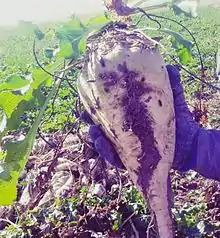The economic biomass potential of Turkey is 32 million tons of oil equivalent (Mtoe)/year.[1] Total biomass production is estimated to reach 52.5 Mtoe by 2030.[2] Arable crops in Central Anatolia and the Mediterranean have the most potential for electricity, and in 2021 biomass generated 7.6 TWh, which was 2.3% of the nation's electricity, from over 2 GW capacity. An estimated 6.5 million homes in Turkey use biomass as their main source of heating fuel.[2]
Tupraş intends to make sustainable aviation fuel. Bioenergy with carbon capture and storage has been suggested to remove residual greenhouse gas emissions after net zero in 2053.[3]
Potential Utilization of Bioenergy in Turkey
Sources of biomass energy include grain dust, wheat straw, and hazelnut shell.[1] Biomass as an energy source is advantageous due to its ability to be readily available all year round.[2]
Biogas
There is significant biogas generation potential in Turkey.[4] More than eighty five million tons of animal waste is produced annually in Turkey. This could be used to produce over 1.8 million tons of oil equivalent (toe). With plant waste included the potential raises to over 5.3 million tons of oil equivalent (toe).[5] However, only 85 biogas facilities with 36 plants are currently in operation in Turkey.[4]
Landfill power is in operation and under construction, including the European side of Istanbul.[6]
Biofuel
One percent of fuel requirements in Turkey are produced by biofuels, with an estimated increase of seven percent in 2023.[7]

Biojet production is hoped to be certified in 2022.[8] A biodiesel plant is planned.[9]
Bioethanol
In 2011, Turkish Energy Regulatory Agency (EMRA) mandated biofuel blending for bioethanol (2%) and biodiesel (1%).[10] Approximately 1.5 million tons of biodiesel and 3 million tons of bioethanol are produced in Turkey.[2] Sugar beets are the main source of bioethanol production in Turkey, followed by corn and wheat, with a yearly production of 15, 4.3 and 20 tons per year, respectively.[11][7]
Biomass Barriers in Turkey
There are drawbacks to using biomass as energy in Turkey. These include but are not limited to: availability (seasonally and geographically), production (based on climate conditions), and cost of transportation. Overall, the cost of biomass waste varies depending on Turkey's economic status and crop production.[2] As of 2022 there are no reliable production or export statistics.[12]
See also
References
- 1 2 Erdogdu, Erkan (2008-06-01). "An exposé of bioenergy and its potential and utilization in Turkey". Energy Policy. 36 (6): 2182–2190. doi:10.1016/j.enpol.2008.02.041. ISSN 0301-4215.
- 1 2 3 4 5 Ozturk, Munir; Saba, Naheed; Altay, Volkan; Iqbal, Rizwan; Hakeem, Khalid Rehman; Jawaid, Mohammad; Ibrahim, Faridah Hanum (2017-11-01). "Biomass and bioenergy: An overview of the development potential in Turkey and Malaysia". Renewable and Sustainable Energy Reviews. 79: 1285–1302. doi:10.1016/j.rser.2017.05.111. ISSN 1364-0321. S2CID 114342109.
- ↑ "Net Zero 2053: A Roadmap for the Turkish Electricity Sector" (PDF).
- 1 2 "Assessment of actual framework conditions and potentials for Biogas investments in Turkey" (PDF). Turkish-German biogas project.
- ↑ "Biogas Energy In Turkey".
- ↑ "Istanbul completes first phase of world's biggest landfill gas power plant". Balkan Green Energy News. 2020-09-17. Retrieved 2020-11-14.
- 1 2 Acaroğlu, Mustafa; Aydoğan, Hasan (2012-01-01). "Biofuels energy sources and future of biofuels energy in Turkey". Biomass and Bioenergy. 36: 69–76. Bibcode:2012BmBe...36...69A. doi:10.1016/j.biombioe.2011.10.004. ISSN 0961-9534.
- ↑ "Türkiye'de biyokütle santralleri 2021'deki elektrik üretiminin yüzde 2,3'ünü karşıladı" [Biomass power plants in Turkey met 2.3 percent of electricity production in 2021]. Anadolu Agency (in Turkish). 7 January 2022.
- ↑ "Archived copy" (PDF). Archived from the original (PDF) on 2014-11-01. Retrieved 2014-11-01.
{{cite web}}: CS1 maint: archived copy as title (link) - ↑ Boluk, Gulden; Koc, A. Ali (2013). "The Implications of Biofuel Policy in Turkey": n/a. ProQuest 1439843299.
{{cite journal}}: Cite journal requires|journal=(help) - ↑ (PDF) http://www.thefarmsite.com/reports/contents/TurkeySugar9May2014.pdf.
{{cite web}}: Missing or empty|title=(help) - ↑ "Concern grows that increased Turkish biomass exports originate from Russia". Bioenergy Insight Magazine. 9 December 2022. Retrieved 2022-12-14.